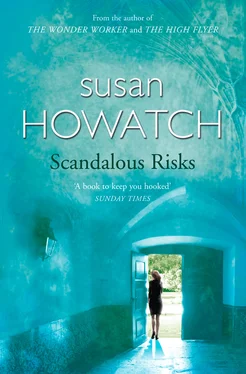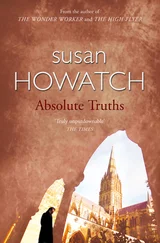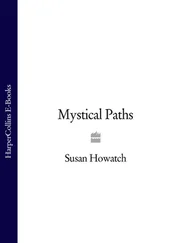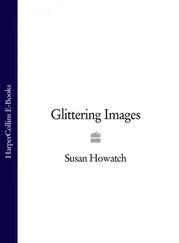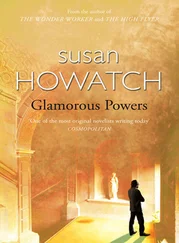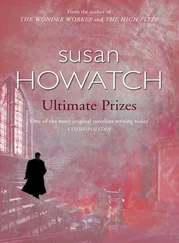‘He offered me the deanery,’ said Aysgarth. ‘By that time, of course, I was almost unconscious with amazement, but I did somehow manage to open my mouth and say “thank you”.’
For a moment my father was silent, and when he was finally able to speak he could produce only a Latin tag. It was an emotional: ‘Fiat justitia!’
Aysgarth tried to reply and failed. Mutely they shook hands. Englishmen really are extraordinary in their ruthless pursuit of the stiff upper lip. If those men had belonged to any other race they would no doubt have slobbered happily over each other for some time.
‘Venetia,’ said my father at last, somehow achieving a casual tone, ‘ring the bell and we’ll ask Pond to conjure up the Veuve Clicquot.’
But I ignored him. Taking advantage of the fact that women were permitted to be demonstrative in exceptional circumstances, I exclaimed to Aysgarth for the first time in my life: ‘My darling Mr Dean!’ and impulsively slipped my arms around his neck to give him a kiss.
‘Really, Venetia!’ said my father annoyed. ‘Young women can’t run around giving unsolicited hugs to clergymen! What a way to behave!’
But my Mr Dean said: ‘If there were more unsolicited hugs in the world a clergyman’s lot would be a happier one!’ And to me he added simply, ‘Thank you, Venetia. God bless you.’
In ecstasy I rang the bell for champagne.
TWO CONTENTS COVER TITLE PAGE Susan Howatch COPYRIGHT PART ONE ONE TWO THREE FOUR FIVE SIX PART TWO ONE TWO THREE FOUR FIVE SIX PART THREE ONE TWO THREE FOUR FIVE PART FOUR ONE TWO KEEP READING AUTHOR’S NOTE ABOUT THE AUTHOR PRAISE ALSO BY THE AUTHOR ABOUT THE PUBLISHER
‘We need to be accepted as persons, as whole persons, for our own sake.’
JOHN A. T. ROBINSON
Suffragan Bishop of Woolwich 1959–1969
Writing about Honest to God in the Sunday Mirror , 7th April 1963
Aysgarth drank quite a bit. Not quite a lot. But quite a bit. There’s a difference. ‘Quite a lot’ means serious drinking twice a day. ‘Quite a bit’ means serious drinking occasionally and moderate drinking in between. Aysgarth was apparently the kind of drinker who seldom touched alcohol during the day but who regularly had a couple of whiskies at six o’clock. If he went to a dinner-party later he would then drink a glass of sherry before the meal, a couple of glasses of wine with the food and a hefty measure of port once the cloth was drawn. This was by no means considered a remarkable consumption in the political circles in which my father moved, and probably the upper reaches of London ecclesiastical society also regarded such drinking habits as far from excessive, yet by 1957 my father was afraid a rumour might circulate that Aysgarth was a secret drinker.
‘He keeps his bottle of whisky behind the Oxford Dictionary in his study!’ my father said scandalised to my mother after this eccentricity had been innocently revealed to him. ‘What a risk to take! He’s paying lip-service, of course, to the tradition that clergymen shouldn’t indulge in spirits, but what are the servants going to think when they discover the clandestine bottle? He’d do better to keep it openly on the sideboard!’
‘Since Mr Aysgarth hasn’t had a lifetime’s experience of dealing with servants,’ said my mother delicately, ‘perhaps he thinks they won’t find out about the bottle.’
‘I disillusioned him, I assure you, but he didn’t turn a hair. “I’m not a drunk and my conscience is clear!” he declared, not believing a word I said, and he even had the nerve to add: “‘ Honi soit qui mal y pense’ !” He’s quite incorrigible.’
My father also disapproved of Aysgarth’s occasional trick of drinking too fast. On that day in 1957 as we celebrated the offer of the Starbridge deanery, he downed three glasses of champagne in a series of thirsty gulps and sighed as if longing for more. It was not offered to him. ‘Fancy drinking champagne like that!’ said my father shocked to me afterwards. ‘No breeding, of course. Not brought up to drink champagne properly.’
I opened my mouth to remind him of his blue-blooded friends who regularly consumed champagne as if it were lemonade, but then I decided not to argue. I was in too good a mood. Instead I merely proffered the opinion that Aysgarth was more than entitled to a quick swill after enduring his wife’s nervous breakdown and the agonising worry over his future.
I was still savouring my relief that the crisis had ended when I learnt that a new cloud had dawned on the ecclesiastical horizon. Calling on us the next day Aysgarth confessed his fear that an old adversary of his might be appointed bishop of Starbridge.
It was six o’clock. (Aysgarth always timed his visits to coincide with the possibility of refreshment.) My mother was attending a committee meeting of the Royal Society of Rose-Growers. Once again my father and I joined forces to support our harassed cleric.
‘Have a whisky, my dear fellow,’ said my father kindly. ‘We’ll pretend you’re not wearing your clerical collar and can drink spirits with a clear conscience. Who’s this monster who might be offered the bishopric?’
‘Oh, he’s no monster!’ said Aysgarth hastily, sinking into the nearest armchair as my father added soda-water to a shot of scotch. ‘He’s just someone I’d be happy never to meet again.’ ‘Your sworn enemy!’ I said, reading between the Christian lines.
‘Don’t be facetious, Venetia,’ said my father. ‘This is serious. Do you have no power of veto, Aysgarth? Surely the Dean and Chapter are always consulted about the appointment of a new bishop?’
‘Unofficially, yes, but officially we have to take the card we’re dealt – and bearing in mind the fact that I’ve only just won the deanery by the skin of my teeth I’m hardly in a position to raise even an informal objection to this man.’
‘But who on earth is he, for God’s sake?’
‘The rumour bouncing off the walls of Church House,’ said Aysgarth after a huge gulp of whisky, ‘is that Charles Ashworth’s been approached for the job.’
‘Oh, him! In that case you’ve nothing to worry about. He’ll never take it.’
‘I know he’s already turned down two bishoprics, but this could be the one bishopric he’s unable to refuse. He’d rank alongside the bishops of London, Durham and Winchester – there’d be a seat available immediately in the House of Lords – he’d be only ninety minutes by train from the centres of power in the capital – and as if all these advantages weren’t sufficient to seduce him, he’d have the challenge of pulling the Theological College together, and he’s an expert on theological education.’
‘I’ve never heard of this man,’ I said. ‘Where’s he been hiding himself? What’s he like?’
‘Oh, he’s the most charming fellow!’ said my father with enthusiasm. ‘Very keen on cricket. A first-class brain. And he’s got a nice little wife too, really a very nice little wife, one of those little women who listen so beautifully that they always make a man feel ten feet tall –’
‘The Reverend Dr Charles Ashworth,’ said Aysgarth, ignoring this sentimental drivel as he responded to my demand for information, ‘is Lyttelton Professor of Divinity at Cambridge and a Canon of Cambridge Cathedral.’
‘So what’s wrong with him?’
‘Nothing. We’re just temperamentally incompatible and theologically in different camps.’
‘Maybe he’ll turn down the job after all!’ I said brightly after we had all observed a moment of heavy silence. ‘Why did he turn down the previous bishoprics?’
My father commented: ‘Being a bishop isn’t every clergyman’s idea of heaven,’ and Aysgarth said: ‘Ashworth preferred life in his academic ivory tower.’ However as soon as this statement had been made he modified it by adding rapidly: ‘No, I shouldn’t say that. Ashworth came down from his ivory tower in ‘thirty-nine when he volunteered to be an army chaplain. That was something I never did. Then he was a prisoner of war for three years. I never had to endure that either. After the war he did return to academic life but not, I’m sure, because he wanted to escape from the world. He must have felt genuinely called to resume his career of writing and teaching, and I’m sure this call is why he’s turned down the previous bishoprics.’
Читать дальше
